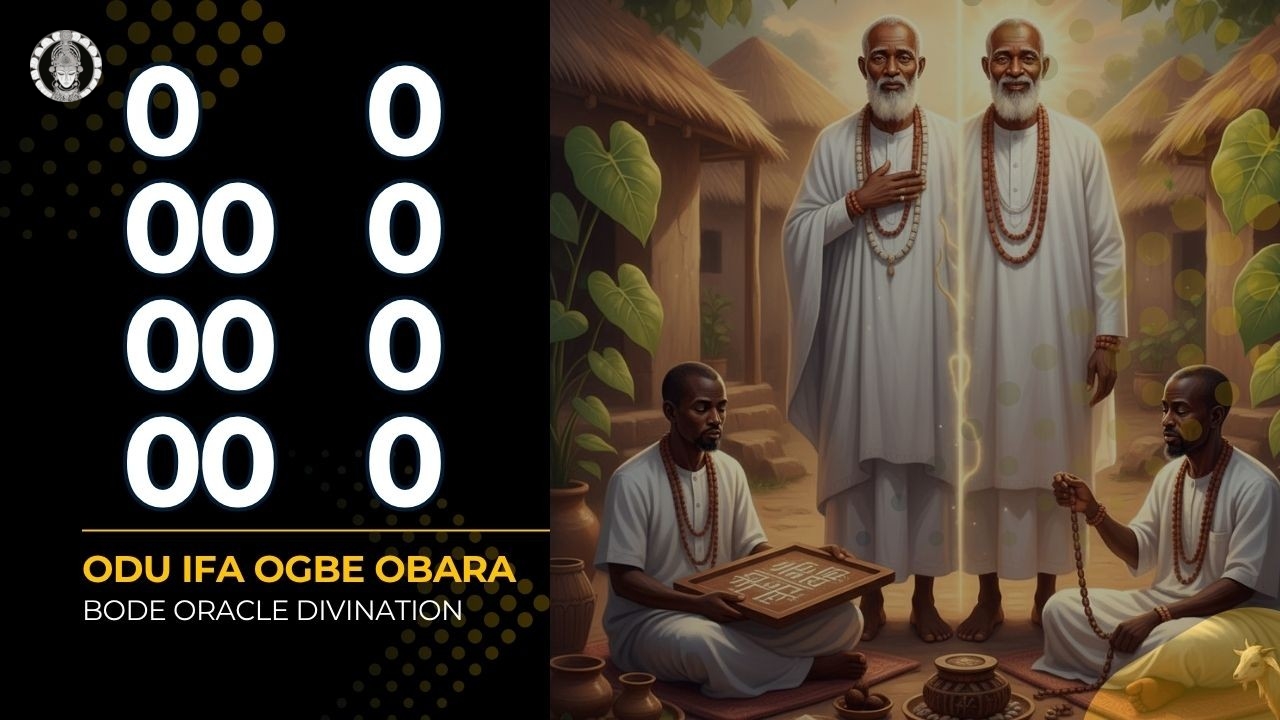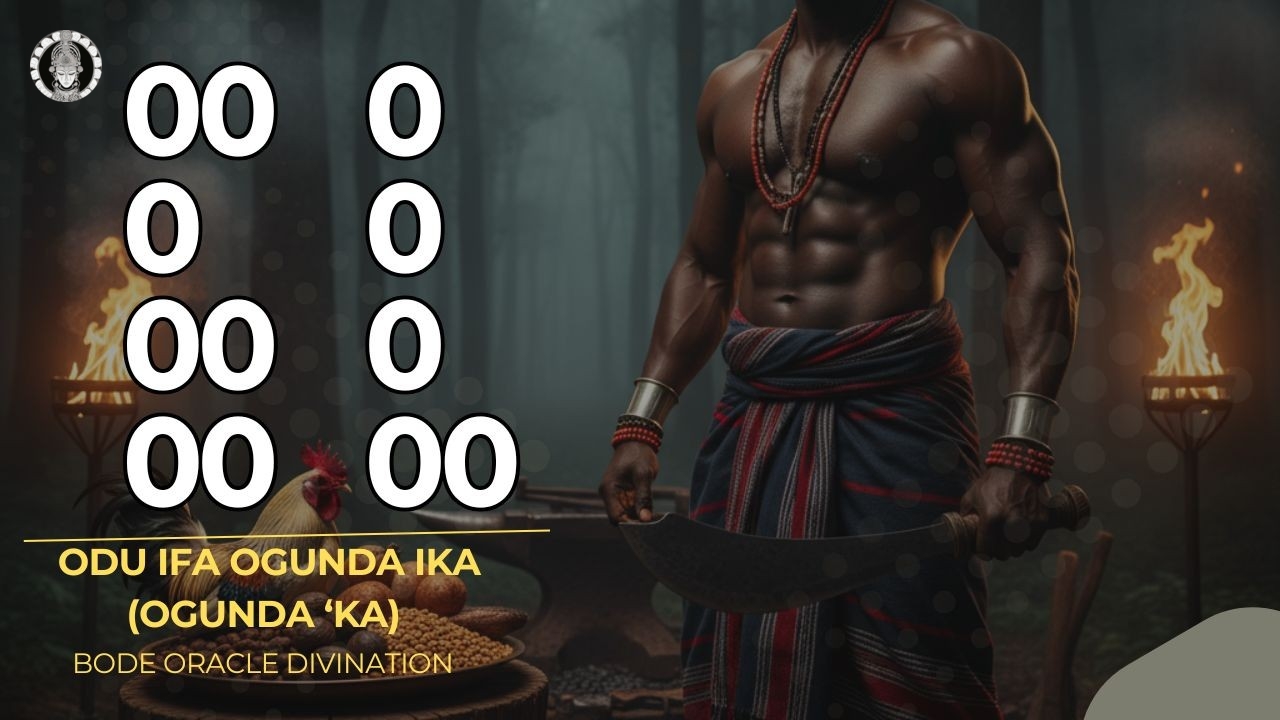Introduction to Odu Ifa Ogunda Ika
Odu Ifa Ogunda Ika represents one of the 256 sacred divination signs in the Ifa corpus. This powerful Odu carries profound messages about triumphing over adversaries, achieving success in competitive situations, protection from malicious forces, and receiving abundant blessings through proper spiritual observance. Through the wisdom of Ogunda Ika, we learn how strategic sacrifice and righteous conduct enable us to overcome opposition and transform challenging circumstances into blessings.
The divinations within Ogunda Ika address fundamental human challenges: conflicts over relationships and partnerships, threats of poisoning and workplace enemies, frustration with hard work that yields no results, and the desperate search for prosperity. Each story serves as both practical guidance and spiritual instruction, teaching us how to navigate life's competitive and adversarial situations with spiritual wisdom and divine protection. For comprehensive understanding of the 16 Odu Ifa and their meanings, explore our detailed guide.
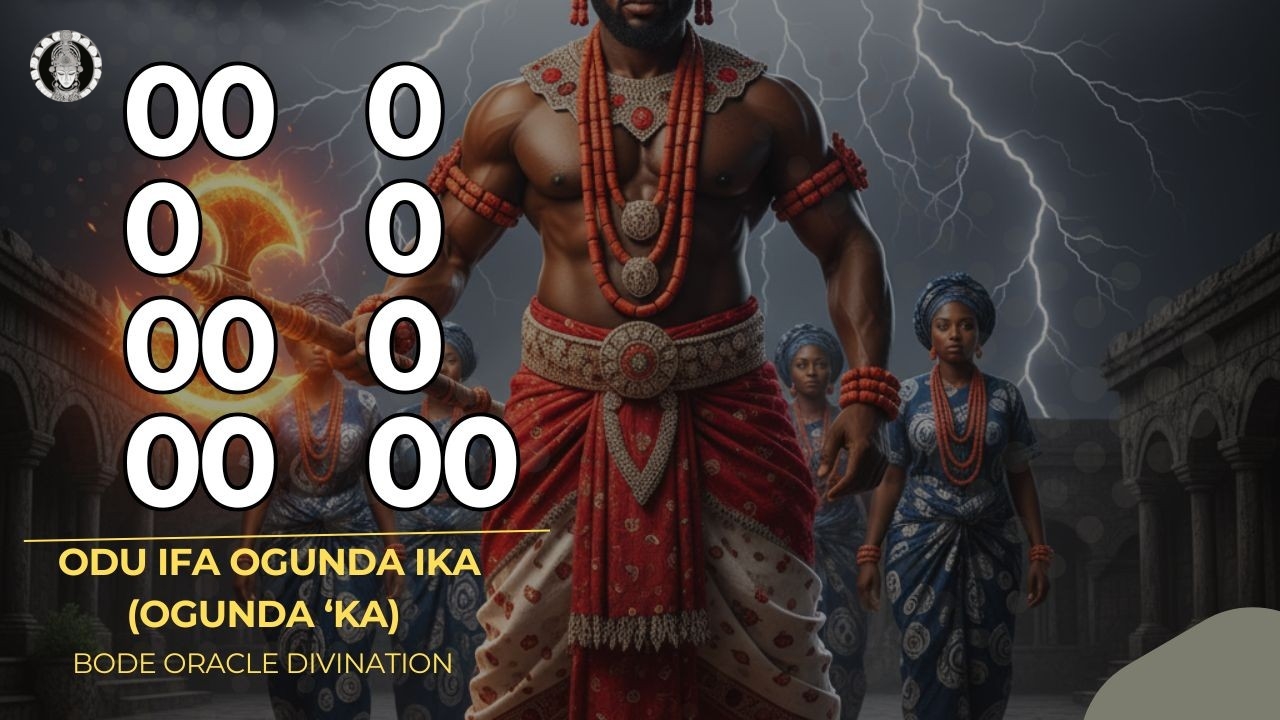
Ifa Divination for Sango: Triumph in Relationships and Competitive Situations
Understanding the Message of Divine Victory
This divination from Ogunda Ika addresses one of the most delicate and potentially dangerous situations in human relationships—taking or being with someone who belongs to another. Ifa reveals through Sango's story that even in such complex circumstances, when proper sacrifice is performed, one can maintain their position without experiencing adverse reactions or retaliation. This divination speaks not only to romantic relationships but to any competitive situation where one person succeeds over another.
Sango, the powerful deity of thunder and justice, represents authority, passion, and the ability to claim what one desires. In this divination, he successfully took wives from both Ogun (deity of iron and war) and other deities, demonstrating that with proper spiritual backing, even the most formidable opposition can be overcome peacefully.
The Sacred Verse
Abe aka ogbomo esin
Ona baluwe ko gbomo ololo pan san
Koni gbologbo ko gbekute ile
Adifafun sango
Ti n lo lee gbarugba
Tii se obinrin ogun
Yo si gba molegbe ti se obinrin oosa
Ebo won ni o se
O si gbebo nibe orubo
Nje mogbarugba mosigba mo legbe.
English Translation
The small place does not permit a house.
The path to the bathroom does not resemble the stone surrounding the house.
Neither the rat nor the cat can be permitted.
Ifa divination was cast for Sango,
Who was going to seize Arugba,
Being the wife of Ogun,
And also seize Molegbe,
Being the wife of the deity.
He was asked to offer sacrifice,
And he complied.
Therefore, I have seized Arugba and Molegbe.
The Wisdom of Strategic Boundaries
The opening metaphors of this verse teach profound wisdom about spatial and social dynamics. When it states "the small place does not permit a house," it acknowledges that some situations are inherently constrained and require careful navigation. The path to the bathroom not resembling the surrounding stone speaks to the difference between temporary passage and permanent foundation—suggesting that maintaining one's position requires more than just initial conquest.
The statement that neither rat nor cat can be permitted teaches about incompatible forces that cannot coexist peacefully in the same space. Yet Sango's success demonstrates that through proper spiritual intervention, even seemingly impossible coexistence becomes possible. The verse teaches that what appears structurally impossible in the physical realm becomes achievable through spiritual means.
Protection from Retaliation
One of the most significant aspects of this divination is its promise of protection from retaliation. Ifa specifically states that the person who has taken someone's wife or partner will not experience adverse reactions when proper sacrifice is performed. This is particularly remarkable given that one of those from whom Sango took a wife was Ogun—the fierce deity of war and iron, known for his terrible vengeance.
This demonstrates Ifa's power to neutralize even the most formidable opposition and prevent conflict that would otherwise be inevitable. The sacrifice creates a spiritual shield that transforms potential enemies into accepting parties, or at minimum, prevents them from having power to harm the person receiving this Odu.
Prescribed Offerings (Ebo)
For protection in relationships and competitive situations, Ifa prescribes a rooster (akuko adie), symbolizing announcement and masculine authority; a hen (agbebo adie), representing feminine receptivity and nurturing; a pigeon (eyele), signifying peace and peaceful resolution despite competition; and money (opolopo owo), facilitating the practical and spiritual aspects of maintaining one's position.
Modern Application and Ethical Considerations
In contemporary society, this Odu speaks to various competitive situations beyond romantic relationships: business competitions where one company takes clients from another, professional advancement where one candidate is chosen over others, or any situation where success means another's loss. The principle remains that proper spiritual preparation allows one to succeed without creating lasting enmity or experiencing retaliation.
However, this divination should not be understood as license for unethical behavior. The spiritual protection it offers works within the context of destiny and divine will. Ifa does not support actions that violate fundamental moral principles, but rather provides guidance for navigating complex situations where competing interests exist. Learn more about Ogunda Ika divination practices on our dedicated page.
Ifa Divination for Ounyagbe: Protection from Poisoning and Workplace Enemies
Confronting Threats in Places of Work
This divination from Ogunda Ika addresses a frightening reality that many people face—threats of poisoning and malicious attacks in their workplace or from those in their environment. Ifa reveals through Ounyagbe's story that someone with a very large farmland or business establishment faces danger from poisoning attempts. The divination provides both warning and protection, showing how to navigate threatening situations with spiritual wisdom.
What makes this divination particularly relevant is its recognition that threats often come from unexpected sources, including one's own spouse. The warning about women, especially wives, reflects the harsh reality that poison and betrayal sometimes originate from those closest to us. This teaching emphasizes the need for spiritual vigilance even in intimate relationships.
The Sacred Verse
Akayalese oba je lori
Adifafun ounyagbe aboko tanrere
Eyi tin toko bo wa ile waje wo
Ebo won ni ko se
O sigbebonibe orubo
Ruru ebo
Eru atuka esu
E wa bani laiku kan giri
Nje kin lo fa niyo ole kan olee kan tin be nile
Aka lofa niyo.
English Translation
Akayalese oba je lori
Ifa divination for Ounyagbe, who has very large farmland,
Who was coming from the farm to the house to take poison.
He was asked to offer sacrifice,
And he complied.
Offering the sacrifice,
Complete offering,
Come and rejoice with the blessing of victory.
Therefore, what rescues someone from evil that is in the house
Is also known as who rescued someone.
The Paradox of the Thief as Rescuer
One of the most profound teachings in this divination is the instruction that if something is lost from one's farmland or establishment, the person should remain silent and not curse the thief. Ifa reveals that the very person who steals from you will later become your rescuer. This paradoxical wisdom teaches patience and restraint in the face of loss, recognizing that relationships and circumstances evolve in ways we cannot predict.
This teaching challenges our natural impulse to curse those who harm us. It suggests that maintaining spiritual equilibrium and refusing to send negative energy toward wrongdoers preserves future possibilities for reconciliation and unexpected help. The thief who today steals may tomorrow reveal who plotted to poison you, or may intercede on your behalf in a critical situation.
The Danger of Curses
Ifa's warning against cursing anyone is particularly emphatic in this divination. Curses create spiritual bonds between the curser and the cursed, and they can backfire in unexpected ways. When someone steals from you, cursing them may prevent them from later becoming the source of help you desperately need. This teaching emphasizes restraint, patience, and trust in divine justice rather than personal vengeance.
In Yoruba cosmology, words carry immense power. A curse spoken in anger can manifest as reality, but it can also bind the speaker to the very person they wish to punish, creating ongoing spiritual entanglement. By remaining silent and allowing divine forces to handle justice, one maintains spiritual freedom and leaves room for unexpected redemption.
Protection Against Poison
The core warning in this divination is about poison—both literal and metaphorical. Literal poison refers to physical substances meant to cause illness or death. Metaphorical poison includes malicious gossip, false accusations, sabotage of one's work, and spiritual attacks designed to destroy one's reputation or livelihood. The divination addresses both forms, offering protection through sacrifice and spiritual vigilance.
The specific warning about women, particularly wives, reflects traditional concerns about domestic poisoning, which historically occurred when marriages were troubled or when wives were influenced by external forces. In modern context, this extends to any intimate relationship where betrayal might occur, emphasizing the need to maintain spiritual protection even in supposedly safe spaces. For scholarly perspectives on Ifa divination as a knowledge system, refer to UNESCO's documentation of Ifa of the Yoruba people.
Prescribed Offerings (Ebo)
For protection against poisoning and workplace threats, Ifa prescribes a rooster (akuko adie), representing vigilance and the announcement of danger, and money (opolopo owo), facilitating comprehensive spiritual protection. The rooster's crow at dawn symbolizes awakening to danger before it strikes, providing spiritual early warning systems against threats.
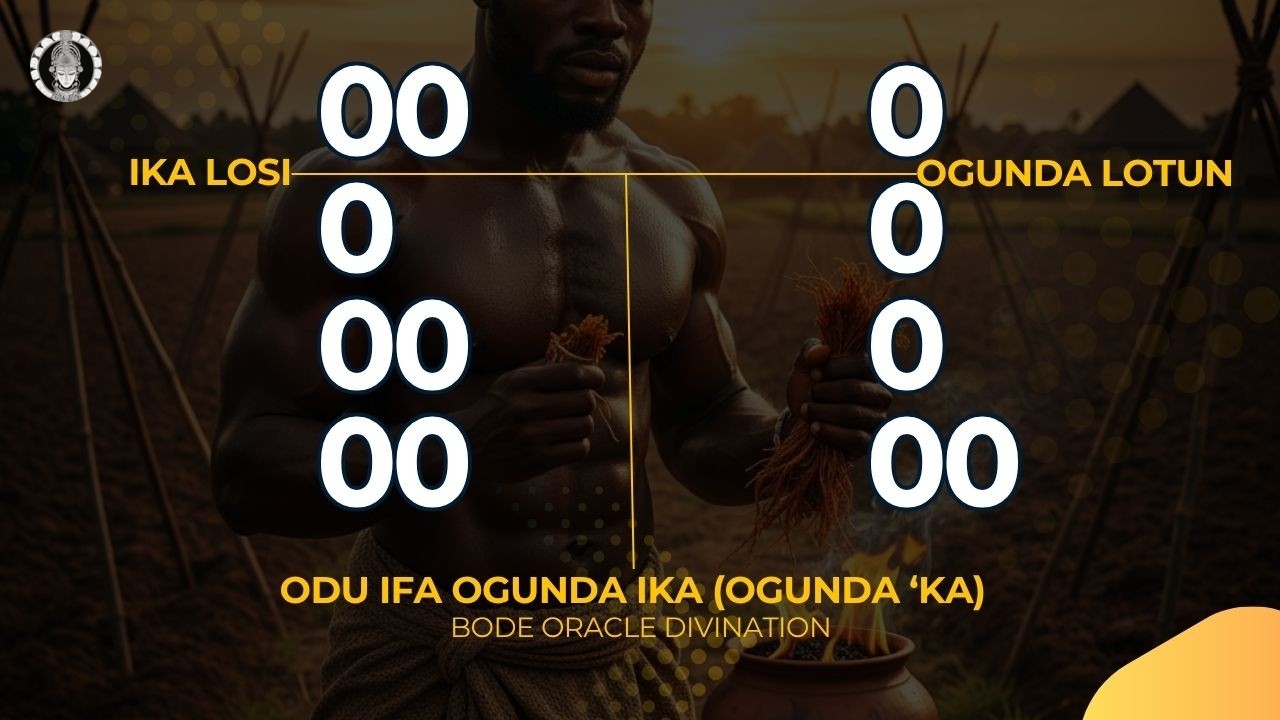
Ifa Divination for Ogun: Success Through Hard Work and Divine Intervention
Breaking Through the Barrier of Fruitless Labor
This divination from Ogunda Ika addresses one of the most frustrating human experiences—working extremely hard yet seeing no corresponding results. Ifa reveals through Ogun's story that when someone labors diligently but success remains elusive, the problem is not lack of effort but lack of spiritual alignment. The solution lies in combining continued hard work with proper spiritual observance, particularly feeding Ogun with his prescribed offerings.
Ogun, the deity of iron, technology, and unceasing labor, represents the archetype of hard work. Yet even Ogun requires spiritual feeding and observance to transform effort into success. This teaches that effort alone, no matter how intense, cannot guarantee results without spiritual support. The divination promises that when spiritual obligations are fulfilled, blessings come with ease—the phrase "atipiri si omodi si atipiri" (bringing blessings with ease) emphasizes effortless manifestation after proper spiritual work.
The Sacred Verse
Atipiri si omodi si atipiri
Adifafun ogun ti o mo sisi ti aka osi mogba
Ebo won ni ose
O si gbebo nibe o rubo
Nje, ogunda kaje de atipirisi omo disi atipiri
Ogunda ka ayade atipirisi omo disi atipiri
Ogundaka omo de atipirisi o modisi atipiri
Ogunda ka ire gbogbo wolede
Atipirisi omodisi atipiri.
English Translation
The one who brings blessings with ease,
Ifa divination was cast for Ogun, who will receive blessings at all times.
He was asked to offer sacrifice,
And he complied.
Therefore, Ogunda has come with the blessing of wealth,
The one who brings blessings with ease.
Ogunda has come with the blessing of a new spouse,
The one who brings blessings with ease.
Ogunda has come with the blessing of children,
The one who brings blessings with ease.
Ogunda has come with the blessing of all goodness,
The one who brings blessings with ease.
The Transformation from Struggle to Ease
The repeated phrase "atipiri si omodi si atipiri" (bringing blessings with ease) represents a fundamental transformation in how blessings manifest. Before proper sacrifice, the person experiences "sisi ti aka osi mogba"—working very hard but unable to receive. After sacrifice, the same blessings come "with ease," suggesting not laziness but rather effortless flow, where effort and result align perfectly.
This transformation reflects a shift from physical struggle to spiritual alignment. When spiritual debts are paid and proper relationships with deities are established, the universe conspires to support one's efforts rather than resist them. Doors open easily, opportunities present themselves, helpers appear, and what once required tremendous struggle now manifests naturally.
The Four-Fold Blessing
The verse specifies four categories of blessing that come through this divination: wealth (ire ola), new spouse (ire aya), children (ire omo), and all goodness (ire gbogbo). This comprehensive list addresses the fundamental aspirations of human life—material prosperity, companionship, progeny, and general wellbeing. The repetition of "atipiri si omodi si atipiri" after each blessing emphasizes that all come with the same ease once spiritual alignment is achieved.
Feeding Ogun: The Power of Roasted Yam and Beans
The specific prescription to feed Ogun with roasted yam (esun isu) and roasted beans (ewa eyan) carries deep symbolic and practical significance. Yam is the king of crops in Yoruba culture, representing sustenance, prosperity, and agricultural success. Beans provide protein and strength. Both foods, when roasted, represent transformation through fire—raw materials becoming something more valuable through purification and change.
Ogun, as the deity of iron and fire, appreciates offerings that have been transformed by heat. The roasting process mirrors Ogun's own nature—taking raw ore and transforming it into useful tools through the application of intense heat and labor. By offering these roasted foods, the worshipper acknowledges Ogun's transformative power and requests similar transformation in their own circumstances. For deeper understanding of Yoruba spiritual philosophy and divination systems, consult scholarly research on the algebraic characterization of Ifa divination codes.
Prescribed Offerings (Ebo)
For breaking through barriers of fruitless labor, Ifa prescribes a rooster (akuko adie), representing announcement of success; a hen (agbebo adie), symbolizing nurturing of blessings; a pigeon (eyele), signifying peace in one's endeavors; roasted yam (esun isu) and roasted beans (ewa eyan), specifically for feeding Ogun; kola nut (obi), for prayers and opening spiritual pathways; and money (opolopo owo), facilitating comprehensive spiritual work.
Ifa Divination for Alasikolo: Seeking Blessings and Divine Fortune
The Cry for Goodness and Prosperity
This divination from Ogunda Ika addresses the universal human experience of desperately seeking blessings when life feels barren and prosperity seems distant. Ifa reveals through Alasikolo's story that someone is crying and pleading for the blessing of goodness—perhaps they have struggled financially for extended periods, or they face circumstances that seem to block every path to prosperity. The divination promises that all forms of blessing are coming to this person when proper spiritual observances are made.
Alasikolo, a resident of Ilawe, represents anyone who has exhausted their own efforts and now turns to Ifa for intervention. The name itself suggests someone seeking support (ala-si-kolo can be interpreted as "one who seeks assistance"). This divination speaks to those moments when human effort reaches its limit and divine intervention becomes necessary for breakthrough.
The Sacred Verse
Loorere sanran
Awo ile alasikolo a
Adifafun alasikolo tona lawe
Igba ti mo mioju so gbere ire
Ebo won ni o se
O si gbebonibe orubo
Ifa mo fun o lasikolo
Ifa ko wa si aro ore temi fun mi.
English Translation
Loorere sanran,
The priest of the house of Alasikolo,
Cast Ifa divination for Alasikolo of the side of Ilawe,
When crying for goodness,
He was asked to offer sacrifice,
And he complied.
Therefore, Ifa, I have come to you for help.
If you came and gave me the blessing of goodness.
The Power of Tears and Sincere Supplication
The phrase "igba ti mo mioju so gbere ire" (when crying for goodness) acknowledges the emotional depth of genuine spiritual seeking. These are not casual requests but desperate pleas born from real need. Ifa recognizes and responds to sincere supplication—when someone reaches the point of tears in their spiritual practice, it indicates they have surrendered pride and are truly ready to receive divine assistance.
In Yoruba spirituality, tears carry spiritual power. They represent the liquefaction of pride, the washing away of self-sufficiency, and the acknowledgment that human power has limits. When Alasikolo cried for goodness, his tears became prayers that moved spiritual forces. The divination teaches that sometimes breakthrough requires us to reach this point of absolute surrender and genuine plea.
Feeding Ifa with Porridge (Asaro)
The specific prescription to feed Ifa with porridge (asaro) carries both practical and symbolic significance. Asaro is made from corn or yam flour cooked into a smooth, nourishing preparation. It represents basic sustenance, comfort food, and the fundamental provision that allows life to continue. By offering this to Ifa, the supplicant acknowledges Ifa as the source of all sustenance and asks Ifa to provide similar nourishment in their life.
Porridge also represents transformation—hard grains or tubers become soft, digestible nourishment through patient cooking and stirring. This mirrors the transformation the supplicant seeks: taking the hard circumstances of their life and transforming them into smooth, nourishing blessing. The offering becomes both request and symbol of what the person hopes to receive.
The Promise of Comprehensive Blessing
Ifa's promise in this divination is comprehensive—"ire gbogbo" (all goodness). This is not limited to one type of blessing but encompasses every form of goodness: wealth, health, children, longevity, peace, honor, and spiritual elevation. The divination teaches that when Ifa decides to bless someone who has truly surrendered and properly performed sacrifice, the blessings come in abundance and variety.
The phrase "Ifa ko wa si aro ore temi fun mi" (if you came and gave me the blessing of goodness) represents faithful expectation—not demanding but trustfully anticipating that Ifa will respond to sincere supplication. This attitude of confident expectation, combined with proper sacrifice, creates the spiritual conditions for manifestation.
Prescribed Offerings (Ebo)
For attracting comprehensive blessings and divine fortune, Ifa prescribes a rooster (akuko adie), announcing the arrival of blessings; a hen (agbebo adie), nurturing blessings to maturity; a pigeon (eyele), bringing peace alongside prosperity; and money (opolopo owo), facilitating all spiritual work. Additionally, porridge (asaro) should be prepared and offered to Ifa as a special feeding.
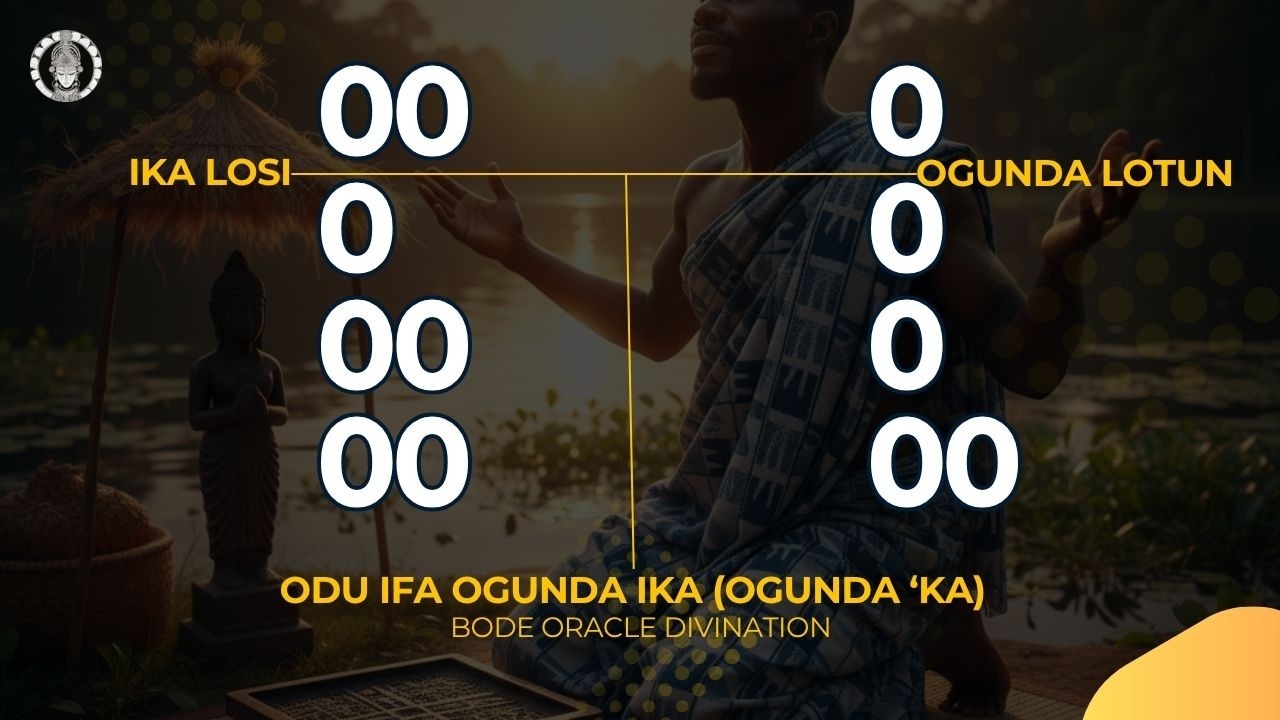
Akose and Spiritual Preparations of Ogunda Ika
Understanding Akose in Ifa Practice
Akose refers to spiritual preparations that combine herbal, mineral, and other natural substances with spiritual invocations to produce specific results. Unlike ebo (sacrifices offered to spiritual forces), akose are preparations used directly by the person—either through bathing, consuming, or applying to the body. The akose of Ogunda Ika are particularly powerful for attracting prosperity and defeating enemies through spiritual cleansing and empowerment.
Akose Awure Ola: Spiritual Bath for Wealth and Fortune
This akose is specifically designed to attract prosperity, honor, and good fortune (ola) through regular spiritual bathing. The preparation cleanses away spiritual obstacles to wealth while simultaneously attracting beneficial forces that bring abundance. Regular use creates a spiritual aura that draws opportunities, helpers, and blessings.
Ingredients and Preparation
The akose requires leaves of Oju Oro plant (ewe oju oro), leaves of Osibata plant (ewe osibata), seawater (omi okun), sea sand (yanrin okun), powdered eeru Alamo (a traditional Yoruba spiritual powder), and black soap (ose dudu). All herbal materials are ground together with the black soap, then mixed with seawater. The sea sand is added to the mixture, and everything is placed in a white plastic bag for use.
Spiritual Significance of the Ingredients
Oju Oro leaves connect to wealth consciousness and financial insight. Osibata provides spiritual protection during the process of accumulating wealth. Seawater and sea sand carry the expansive energy of the ocean—representing limitless abundance and the constant flow of blessings. Eeru Alamo is a powerful protective and attractive substance in Yoruba spirituality. Black soap cleanses away negative spiritual influences while the white container represents purity of intention.
Method of Application
The preparation should be used for bathing every morning. Morning represents new beginnings and fresh opportunities, making it the ideal time for spiritual cleansing and empowerment. Consistent daily use creates cumulative spiritual effects, progressively clearing obstacles and strengthening the person's aura of prosperity. The bathing should be done with focused intention, visualizing wealth and blessings flowing into one's life.
Akose Isegun Ota: Spiritual Bath for Victory Over Enemies
This akose provides protection from enemies and empowers the person to triumph in conflicts and competitive situations. It creates a spiritual shield that deflects attacks while simultaneously weakening the ability of adversaries to harm the person. Regular use establishes spiritual dominance that causes enemies to lose power over time.
Ingredients and Preparation
The akose requires leaves of Imi Eran plant (ewe imi eran), powdered eeru Alamo, nine small but solid stones (ako okuta were mesa), black soap (ose funfun/dudu), and red soap (ose pupa). The plant material is ground together with the stones and eeru Alamo, then mixed with both black and red soap. The preparation is used for morning bathing.
Spiritual Significance of the Ingredients
Imi Eran leaves possess warrior properties that strengthen resolve and courage. Eeru Alamo provides comprehensive spiritual protection. The nine stones represent stability, grounding, and the solid foundation needed to withstand attacks—nine being a number of completion and permanence in Yoruba numerology. Black soap cleanses away negative influences while red soap invokes warrior energy and the power to dominate adversaries.
Method of Application
This preparation should also be used every morning for bathing. The combination of cleansing and empowerment in one preparation means that as spiritual attacks are washed away, spiritual armor is simultaneously being built. The person should bathe with confidence, affirming their victory over all opposition. Explore more wisdom from our collection of Ifa teachings.
Important Considerations for Akose Use
Both akose preparations should only be prepared under the guidance of a qualified Babalawo who can properly invoke the necessary incantations. The spiritual power comes not just from the physical ingredients but from the prayers and invocations that accompany their preparation. Consistency in use is essential—sporadic application produces limited results while daily use creates powerful cumulative effects. For understanding the artistic and cultural dimensions of Ifa practice, explore research on Ifa as an artistic expression of Yoruba knowledge.
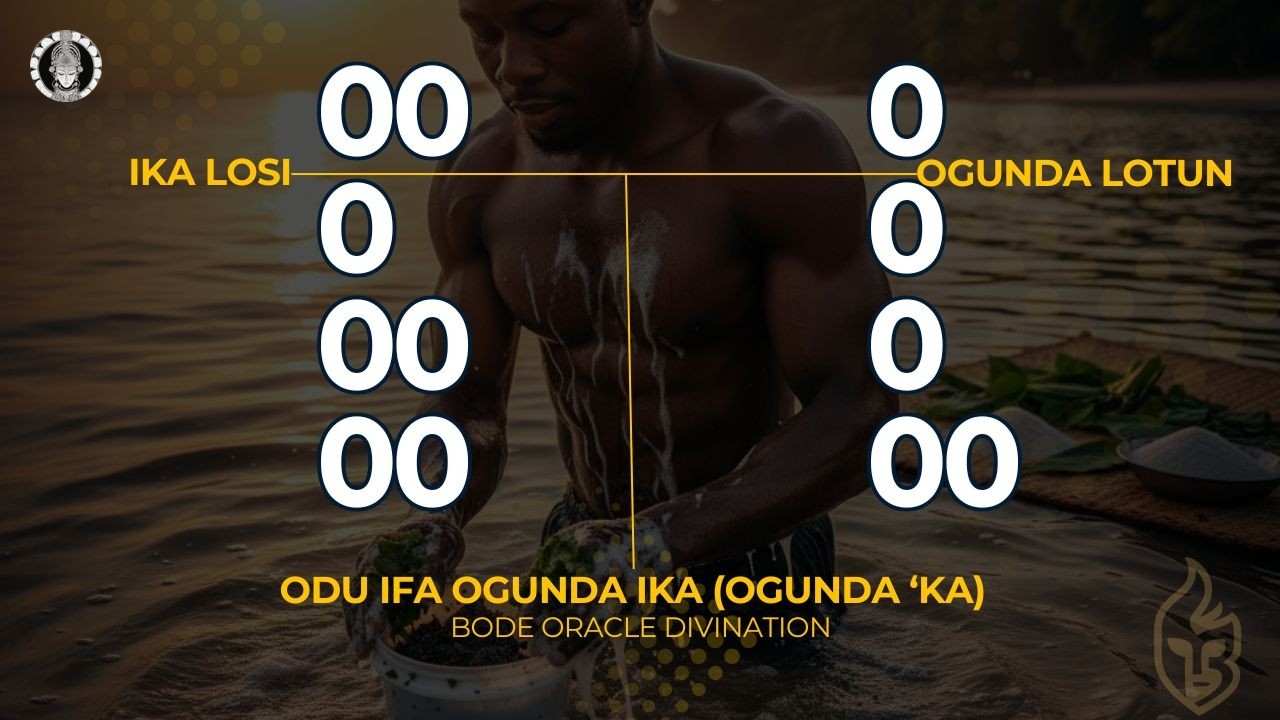
Additional Resources
Internal Links
- Complete Guide to Ogunda Ika - Detailed information, taboos, and practices
- Bode.ng Blog - Extensive collection of Ifa and Yoruba spirituality articles
- Complete Odu Ifa Directory
- All About the 16 Odu Ifa and Their Meaning
- Bode Oracle - Access divination services and community resources
External Resources
- African Traditional Religions: Ifa Divination - Duquesne University
- Ifa Divination System - Wikipedia
- Ifa of the Yoruba People of Nigeria - UNESCO Archives
- Algebraic Characterization of Ifa Main Divination Codes
- Ifa Divination System: An Artistic Expression of Yoruba Knowledge Creation
- UNESCO Recognition of Ifa Divination System
Connect With Us on Social Media
- BODE Oracle on TikTok
- BODE Oracle on YouTube
- BODE Oracle on Facebook
- BODE Oracle on X (Twitter)
- BODE Oracle on Pinterest
Visit Bode.ng to explore more divination teachings, participate in quizzes and polls, and connect with our community of practitioners and learners. Register today to access exclusive content and personalized guidance on your spiritual journey.
Frequently Asked Questions And Answers About Odu Ifa Ogunda Ika
Find answers to common questions about this sacred Odu Ifa and its divination teachings
Ogunda Ika is one of the 256 sacred Odu (divination signs) in the Ifa corpus. It carries powerful messages about triumph over adversaries, receiving blessings from deities like Sango and Ogun, achieving success in work and relationships, and protection from malicious forces. This Odu teaches that through proper sacrifice and righteous conduct, one can overcome opposition and receive abundant blessings.
The divination of Sango in Ogunda Ika specifically addresses situations where someone has taken another's wife or partner. Ifa promises that through proper sacrifice (rooster, hen, pigeon, and money), the person can maintain their relationship without adverse reactions or retaliation. The divination shows that Sango successfully took wives from both Ogun and other deities through compliance with spiritual prescriptions.
The divination of Ounyagbe teaches protection against poisoning and workplace threats. When someone owns farmland or a business establishment and experiences theft or malicious attacks, Ifa prescribes offerings of a rooster and money. The Odu warns against cursing those who steal from you, as they may later become your rescuers. It emphasizes caution with women, especially wives, to avoid being poisoned.
The divination of Ogun addresses situations where someone works very hard but sees no good results. Ifa promises that through proper sacrifice and feeding Ogun with roasted yam and beans, success will come with ease. The phrase "Atipiri si omodi si atipiri" (the one who brings blessings with ease) emphasizes that blessings of wealth, new spouse, children, and all goodness will manifest when spiritual obligations are fulfilled.
The divination of Alasikolo teaches that when someone is desperately seeking blessings of wealth and goodness, they should offer sacrifice and feed Ifa with porridge (asaro). This divination promises that all forms of goodness are coming when proper spiritual observances are made. It addresses the tears and struggles of those searching for prosperity, offering hope and concrete spiritual solutions.
Ogunda Ika teaches through Ounyagbe's divination that the very person who steals from your farmland or establishment may later become your rescuer. Cursing them creates spiritual entanglement and prevents future positive interactions. By maintaining silence and trusting divine justice, you preserve the possibility that this person will later help you in critical situations, perhaps revealing who plotted against you or interceding on your behalf.
Akose Awure Ola is a spiritual bathing preparation designed to attract wealth, honor, and fortune. It combines Oju Oro leaves, Osibata leaves, seawater, sea sand, eeru Alamo powder, and black soap. These ingredients are ground together and placed in a white plastic bag for morning bathing. The preparation cleanses spiritual obstacles to wealth while attracting beneficial forces that bring abundance.
Akose Isegun Ota is a spiritual preparation for victory over enemies. It combines Imi Eran leaves, eeru Alamo, nine small solid stones, black soap, and red soap. These are ground together and used for morning bathing. The preparation creates a spiritual shield that deflects attacks while weakening adversaries' ability to harm you. The nine stones provide stability and grounding, while the soaps cleanse negative influences and invoke warrior energy.
Ogun, as the deity of iron and fire, appreciates offerings that have been transformed through heat. Roasted yam and beans represent transformation of raw materials into something more valuable through fire—mirroring Ogun's own nature of transforming raw ore into useful tools. These foods symbolize the transformation from struggle to success that the worshipper seeks. The roasting process purifies and changes the offerings, making them spiritually potent for Ogun.
All sacrifices (ebo) and spiritual preparations (akose) in Ogunda Ika should be performed under the guidance of a qualified Babalawo (Ifa priest). The priest ensures proper procedures, invokes necessary incantations, and adapts traditional practices to modern contexts when needed. The spiritual power comes not just from the physical materials but from the prayers, invocations, and spiritual knowledge that accompany preparation and offering.
The phrase "Atipiri si omodi si atipiri" (bringing blessings with ease) represents a transformation from struggle to flow. Before proper sacrifice, a person works very hard but cannot receive results. After sacrifice, blessings manifest effortlessly—not through laziness but through perfect alignment between effort and outcome. Doors open easily, opportunities present themselves, helpers appear, and what once required tremendous struggle now manifests naturally.
You can explore comprehensive information about Ogunda Ika through several resources:
- Complete Guide to Ogunda Ika - Detailed taboos and practices
- Bode.ng Blog - Extensive articles on Ifa spirituality
- Complete Odu Ifa Directory
- Bode.ng - Access divination services and community resources
Connect with us on social media for regular teachings: TikTok, YouTube, Facebook, X (Twitter), and Pinterest @BODEOracle.
